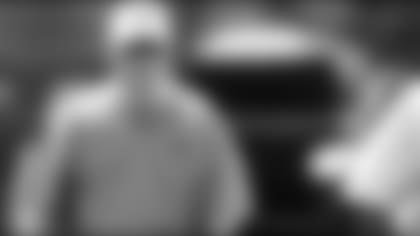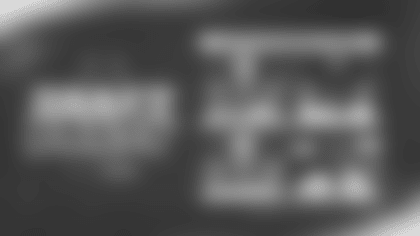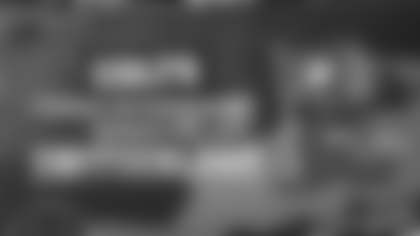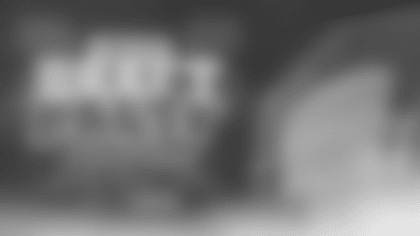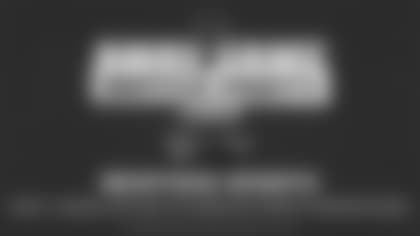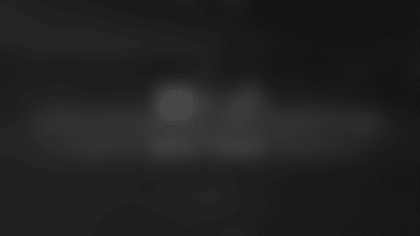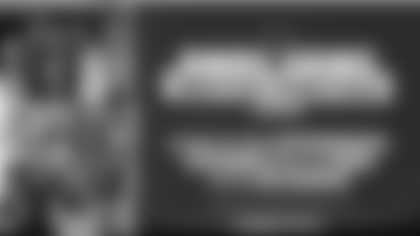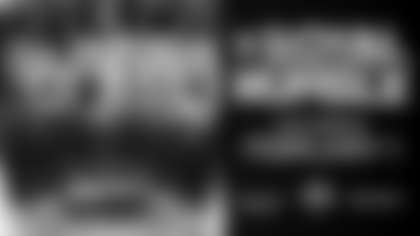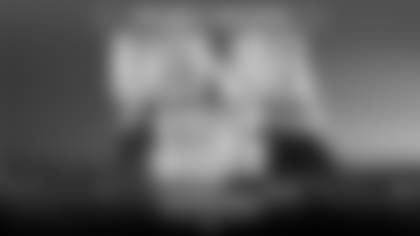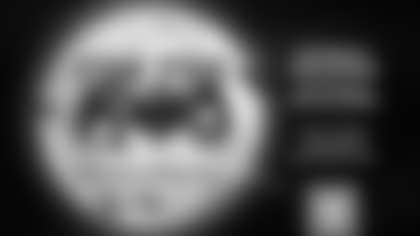Week 2: Colts vs. Vikings
Bill Polian, in his 11th season as Colts president, has a resume unique in the NFL. One of two men to win NFL Executive of the Year five times, Polian in the 1980s built the Buffalo Bills into a four-time Super Bowl participant. In the mid-1990s, he built the expansion Carolina Panthers into a team that made the NFC Championship Game in its second season, 1996. Since joining Indianapolis in 1998, he built the Colts from a 3-13 team in 1997 and 1998 into one that has made the playoffs eight of the last nine seasons, including an AFC Championship Game appearance after the 2003 and 2006 seasons, AFC South titles in 2003, 2004, 2005, 2006 and 2007 and a Super Bowl championship following the 2006 season. Each week during the season, in The Polian Corner, Polian and Colts.com will discuss issues pertinent to the Colts and the rest of the NFL.
Question: A 29-13 loss to the Chicago Bears in the regular-season opener on Sunday Night. That's the first loss in the season opener for the Colts since 2004 and only the third loss in September since 2001. Colts Head Coach Tony Dungy said Monday although usually things look better when watching the tape after a loss this was one of the few instances were that wasn't true.
Answer: He's right. He's absolutely right. My sentiments, exactly. It was actually worse when you watch the tape.
Q: What was the explanation? Was Chicago better prepared?
A: They certainly had terrific game plans on both sides of the ball. I can't say that we did not anticipate what they were going to do defensively. We did. We had stuff prepared to counter it. Let me start with the positives first. (Hall of Fame Head Coach) Don Shula taught me a long time ago any time you go out there and compete you have to take some positives away no matter how badly you played. The positives were all on offense, basically. On the one hand, we did a really good job handling what was a complex, complicated scheme that they used defensively – again, that we anticipated. When you have a quarterback that they anticipate probably can't run, probably can't bootleg – and by run, I mean escape on running plays or bootleg – and whose timing may be a little bit off with his receivers because he hasn't had a lot of playing time with them under game conditions . . . they had the exact right plan for that. When you add in the fact that we had three essentially rookie linemen because they were playing new positions or they were bonafide rookies in the middle of the line, they said, 'OK, we'll make life miserable for them.' They did, or tried to. It was a good plan. They made us make perfect throws on time because of their coverage. We made some. Not enough. They made us block their stunts and put (Colts quarterback) Peyton (Manning) in a position – and they knew this, too; and good for them – where he was going to basically have to make the protection calls. That slowed our tempo down. Had we been able to go up-tempo with (injured center) Jeff (Saturday) in the game, I think it's a different football game, a very different football game. That scheme doesn't work quite as well when you go up-tempo. We couldn't, so great credit to them for figuring all of that out in advance. They clearly spent a lot of time in the preseason not worrying about the preseason but worrying about us, and it paid off. From a standpoint of how we played, essentially the pressure didn't bother us. The sacks that came were physical errors by guys just matched up. There were no mental errors. There was no lack of pickup. There was nothing of that sort. Occasionally, a player will get beat. That's what happened – at the end of the game, principally. We made some plays. Not enough. But we made some plays. We moved the football. We had an unfortunate situation on the 4th-and-1 (in the fourth quarter), which in my mind was the turning point in the game. We had a very difficult blocking assignment on the front side of the play. If you have veteran players, here's what veteran players do for you: they've been in the situation before and they recognize that, 'Hey, we only need one yard and we have Dommy (running back Dominic Rhodes) back there, who makes one yard most of the time.' So, if you have a difficult blocking assignment and you have a choice between blocking the down lineman or the linebacker, go block the lineman and let Dommy go get the yard. A young player who has not been in that situation before says, 'Well, I'm supposed to block the lineman and then I'm supposed to chip on the linebacker.' As a result, we don't get a clean block and the play gets blown up and Dommy has to cut back and we don't make it. The good news is as those young guys play and get better, that experience will be money in the bank for them. We will get better offensively. Our timing will improve. It's not rust, by the way. I've heard the word, 'Rust,' today (Monday) ad nauseam. It isn't rust. It's simply a matter of timing. That timing will get better day by day as we go along, as will the timing and the cohesion of the offensive line. Having said that, they (the Colts' offensive linemen) handled a very complicated scheme very, very well. We didn't catch enough balls, is what it boiled down to. Credit to them, because they made us make the hard throws and they made us make the hard catches. Great credit to them. They had a terrific plan. They recognized that we block well enough – even with our young guys in there – that they weren't going to get clean rushes all the time. They had their people – inside particularly – when they recognized they were blocked put their hands up right away. They got a couple of deflections and a couple of balls that were just off target just a little bit. It was well-conceived – really a well-conceived plan. You can't give them enough credit for that. There's always another team out there. They did a heck of a job. Having said that, if we catch the ball as we always do – and that's again just a matter of timing, I think – it's probably a very different game. The (third-quarter) turnover, of course, is critical and we can't have that. It's an error. You have to correct that. The good news is that all of that is correctable. None of that has to do with scheme. None of it has to do effort. None of it has to do with the inability to compete. It has to do with cleaning up errors and making sure we're in a position that when we have the opportunity to make plays we make them. And just having the timing and the cohesion that comes from playing together. But, again, I can't tell you how impressed I am with the job they did defensively – little things that no one notices, like when a linebacker or a corner is doing what we call a buzz, which is to get out in the flat and under an out route . . . boy, they were out there 16 yards. They really did a phenomenal job. They were prepared. They knew exactly where to go. It was like watching a clinic, the way they played our receivers. They don't have fast corners, but they played our receivers perfectly. They made us make the perfect throws. They were well-coached. You take your hat off to them. You really do. That's why they went to the Super Bowl (following the 2006 season). You can read all of the nonsense you want about people criticizing them. The reason they went to the Super Bowl is because when that defense is healthy, with (defensive tackle Tommie Harris) and (linebacker Brian) Urlacher, etc., etc. – (defensive end Alex) Brown – they're among the best football teams in the National Football League. They showed it last night. Having said that, the positive is we handled everything they threw at us and if we had executed and caught the ball, (it's a) different game. All of that can be improved. Now, for the bad: on the defensive side, I felt like we didn't compete as hard as we should have in certain instances. That will change for sure. There were certain situations where we didn't execute as well as we should have in very simple kinds of situations. That has to improve. We got beaten up pretty badly, I think, physically, over the course of the game. I don't know if we were quite prepared for that kind of a game where they come blasting at you with that big back and they're really not trying to score a lot of points – they're just trying to knock you out. They did. They beat us on a TKO and that hasn't happened to us in a long time – maybe since Jacksonville (a 44-17 loss in December 2006). So, you have to give them credit for doing it. It's not easy to take. Special teams, we didn't do anything of any import positively or negatively. We had one fumble, which fortunately didn't get overturned on replay. We gave them great field position, but they didn't get any great returns, either, so it's sort of a standoff. In terms of defensively, we got TKOed. There's no other way to say it. We got beaten up physically. They won the physical battle and that hasn't happened to us for a long time.
Q: People will say, 'Well, it's because you have small players and they have big players . . .'
A: You know what? They might be right in this instance. There are ways to counteract it, but when you face the kind of game plan that they employed – which was great, by the way – if you're going to play that kind of a team, you better be prepared to stand in there and go toe-to-toe with them. By the way, we're playing that kind of a team next week.
Q: Are they similar – Minnesota and Chicago?
A: Some people think Minnesota is better. I don't pay much attention to pundits, as you know, but all of the pundits think Minnesota is better. I know they have a much more explosive back (second-year running back Adrian Peterson). Much more explosive back – backs, plural. We've seen (Vikings reserve running back) Chester Taylor before – in Baltimore. He's a very good football player. There were times defensively where we played very well, but the fact is we gave up a 50-yard run on 3rd-and-long. We were in a position where it was 3rd-and-16 and we gave up a big pass play because we were in man-to-man coverage. We did get pressure on the passer, but they weren't going to expose him a whole heck of a lot. The object was to just bang the ball at us and create 3rd-and-2, 3rd-and-3, 3rd-and-1 and then make them. They did. If you look at the statistics, it's not very pleasant. They converted 10 of 16 third downs – 63 percent. You can't win a game in the National Football League – you can't win a game in high school – with the opposing team doing that.
Q: Of that percentage, the Bears were seven-of-seven on 3rd-and-1 or 3rd-and-2 . . .
A: If you can't stop that running game on Downs 1 and 2 – give them the occasional play-action pass that's going to happen when you're in three-deep coverage – if you can't stop that running game on first and second down, the odds of stopping them on third down are not very good. That's what occurred and they ate clock in the process.
Q: What has to change? Can this get fixed before Sunday?
A: I think so. Every game is different. Every week is different. You have different challenges and different matchups. As I say, I thought we did well offensively and we'll only improve on that as the season goes on. Defensively, we know what we have to do. We have to stop the run. We can't be giving people four yards a carry, five yards a carry. Whether the guy is a downhill runner or not, you have to stop him. When a guy runs downhill, the best way to stop him is to make him go east and west. We haven't done that. We have to figure out a way to do it. There are ways to do it. There are ways to attack people defensively and force them to do things they don't want to do and not be purely reactive. You can get better. There's no question about that. It's not that any of us feel that we don't have good players here. It's a question of making plays and perhaps getting the right matchups in certain situations. We'll work on that and get better.
Q: The Vikings played on Monday night. Any sort of advantage there with them having one day less to prepare and you being able to watch the game?
A: No and no. It's actually at this time of year an advantage for them to be on the short week. First of all, they play our defense. (Former Colts defensive assistant) Leslie Frazier is the (Minnesota defensive) coordinator. Not only does he know our offense pretty well, he knows what he wants to do against it. Looking at the Chicago tape playing our defense against us – whether they look at it (Monday), tomorrow (Tuesday) or the next day – is not going to be any problem for them. Secondly, they have different personnel up front. They have two kahunas at the defensive tackles. I suspect they will play a little bit differently on the front than Chicago did. They will know what they want to do and already have it in. For us, we get the tape a day late. We will not have seen in the preseason anything meaningful. We'll get dribs and drabs of it. One thing we know is their running backs can run and they have a great blocking offensive line, so getting the tape a day late for us is a disadvantage. Short week, conventional wisdom would say advantage to us. I think not. I think it's an advantage to them because of the strategy and tactics involved.
Q: Talk about the play of the Colts' offensive line, particularly the three interior players.
A: (Rookie center) Jamey Richard actually did very, very well. He did far better than I think Chicago expected him to do and much more obviously than any pundit expected. He was great, really. On top of that, he did exactly what we thought he was going to do. He competed like the devil. He's a tough guy and he wasn't about to back down to (Bears defensive tackle) Tommie Harris or (defensive tackle Rusty) Dvoracek. He hung in there and did more than hang in there. He did a terrific job. We didn't go up-tempo. That would be too much to put on Jamey in that situation. Peyton and Jeff have been doing that for 10 years, so that's a little much, but other than that, you wouldn't know that Jeff wasn't in the game. A great credit to Jamey Richard. Great job, and a great job by (offensive line coach) Howard Mudd and (Assistant Offensive Line Coach) Pete Metzelaars getting him ready. The same is true of Charlie Johnson at left guard and Dan Federkeil at right guard. They all did a terrific job.
Q: Any thoughts on the two plays that Colts Head Coach Tony Dungy challenged – the fumble by wide receiver Marvin Harrison in the third quarter that Bears linebacker Lance Briggs returned for a touchdown and the safety in the first half?
A: The fumble was a fumble. There was no question in my mind about it. Given the fact that it was a scoring play, it was certainly well worth replaying in the event that somehow the official would make a mistake, but according to the rule, it was a fumble. The safety, I thought, was not a safety. I thought his (Colts running back Joseph Addai's) forward progress had gotten him out of the end zone. It's not where he placed the ball that counts. The question was, 'Did his forward progress get him out of the end zone?' I thought clearly that it did, but John Parry disagreed. That's the way it is. We ought not to be in that situation anyway. You take your chances in those situations and again, that was such a critical play that it was certainly worth replaying.
Q: What were your impressions of the first game at Lucas Oil Stadium?
A: The stadium, I thought, was as loud as we experienced in the old one. I found myself shouting just to make conversation with people. We had the window in our booth opened. It sounded very, very loud to me and (Bears quarterback Kyle) Orton was walking around and talking individually to his running backs and his offensive line, which would indicate they were having difficulty hearing and that was with the roof open. So, with the roof closed, I'm sure it would be loud or louder. There's a theory that says it's going to be louder (than the RCA Dome), because there is a lot of metal material in the roof and around the building that will reflect sound more than the Teflon roof of the dome did. That's a theory. I can't tell you whether it's true or not, but it seemed to that it was as loud as the old building was as long as we were in the game.
Q: If that's true, is there a possibility the roof in Lucas Oil Stadium could be closed even on good-weather days?
A: I think it's going to be trial and error. The whole idea here was to create a stadium that was fan-friendly and one that during the beautiful months of the fall – certainly September and October – could be open if the weather was good. (Colts Owner and Chief Executive Officer) Jim (Irsay) and I must have said 50 times in my 10 seasons previously, 'Boy, we wish we had a retractable roof today. The temperature is 72, there's not a cloud in the sky, it's mid-October and the sun is shining brightly.' You'd like to have that atmosphere. It's great. If we can have that and still maintain our home-field advantage, which I think we can, that would be a good thing. I thought it was a little warmer on the field than I remembered at the dome, but the players said, 'No.' There were no problems with that at all. That was a relatively warm and humid evening. I think we'll try to leave it open as much as possible. Now, part of the difficulty you have with buildings like this is the last thing you want – and I discussed this with the (NFL) Commissioner (Roger Goodell on Sunday) night – is to have to close that roof in an emergency. No. 1, there's not very good drainage on the field for obvious reasons. Second of all, you don't like to alter the conditions of play during a ballgame. That isn't fair to anyone. If we get an iffy weather report, we'll probably err on the side of caution and say, 'Hey, the roof is closed.'
Q: Can you update some of the injuries sustained by Colts players Sunday. Running back Joseph Addai left the game with a head injury and tight end Dallas Clark left with a knee injury . . .
A: Joe is fine. He cleared (Sunday) night, so there were no issues there. The doctors were fairly optimistic about Dallas and I have heard nothing that tells me otherwise. We're probably in pretty good shape there.
Q: How do you feel about the Colts' linebacker situation? The Texans recently released veteran linebacker Rosevelt Colvin . . .
A: We had the same worries about Rosevelt that Houston ended up having, that the injury was not far enough along to allow him to perform at a high level. Our linebackers are in good shape and we added Buster Davis on a waiver claim from the Detroit Lions. Buster is a fine addition for us. He plays middle linebacker. He gives us an experienced backup who has played in the (Colts' defensive) system for quite some time. He played in a modified version of it in college and played in the exact same system in Detroit. It's a seamless transition and we're very happy to have him with us. We think we're in pretty good shape at the linebacker position and we should get better as time goes by when people heal up.
Q: What's the progress of Colts center Jeff Saturday? He missed the regular season-opener with a knee injury sustained during the preseason . . .
A: Jeff is going to work very heavily this week and see how he tolerates it. If he tolerates it well, there is some likelihood that he could be active quite soon. It's just a matter of trial and error. He is symptom-free at this point. We'll see when we load him up with heavy work how he responds. (Rookie offensive guard) Mike Pollak had a scope in recent days. They removed a couple of pieces of cartilage. The knee is fine. Right now, we're anticipating he could be back after the Week 4 bye week but it could be sooner than that.
Q: And again, you said rookie center Jamey Richard – a seventh-round selection in the 2008 NFL Draft – played well in his first NFL start, starting in Saturday's place . . .
A: The reason we drafted him is because of his toughness. He's a tough cookie. He is not going to back down from anybody. He stands right up to them. He'll hit back at the first sign of anybody trying to bully him. You need players like that and it's a great trait to have in a center. Jeff Saturday has the same trait. He's a very smart guy. He understands the game. He's a quick study. We're very, very happy to have him.
Q: The Colts really didn't use the up-tempo offense as much against Chicago, did they?
A: It's a salient point. The reason we couldn't do it is because all of the movement they were giving us up front. They were jumping late into different looks with eight men up in the box that required identification and a blocking call and sometimes a change in how you protect the quarterback. Jamey was doing a good job of it, but Peyton had to make sure he was getting the last look so we could get the right protection when they jumped like that. It will become second-nature to Jamey. It is second-nature for Jeff. There's no question if Jeff had been in there we probably go at a much faster pace, because he makes that call almost unconsciously. But again, Peyton wanted to make sure the offensive line knew exactly who they were going to block. Don't forget: we had Charlie Johnson playing left guard for the first time, Jamey Richard playing center for the first time and Dan Federkeil playing right guard for the first time. We're erring on the side of caution. Again, as I said at outset, great credit to them for managing the time when they were on offense so well – slowing down the game, bleeding the clock, smashing the ball at us. We have to have an antidote to that, because until Jeff gets back, it's pretty tough to go at a breakneck pace.
Q: The Colts didn't use the stretch play – a staple in their running game – much against Chicago. Why not?
A: We felt like the timing with Peyton's knee and not having had a whole heck of a lot of practice and the ability to boot off – it was not something we really wanted to do. Anticipating what Chicago would do, we felt like the toss was the better play, but the stretch play will be back in there very soon.
Q: Overall, both you and Tony seemed very disappointed with the loss . . .
A: We've used the slogan around here for a long time, 'Do What We Do.' You can make the argument we didn't do what we normally do (Sunday) night. We've got to get back to doing what we do, which mean playing really tough defense, stopping the run, attacking people on the line of scrimmage, being smart, not having mental errors in certain situations, dropping coverages – as occurred on the long pass that set up their touchdown in the 3rd-and-1 situation, catching the ball . . . We don't drop the ball in five games as much as we did Sunday night. Part of that is timing and a small part is getting used to the lights in the stadium. There's a different level of lighting there that you have to get used to. That will all improve. It improves with work. We need to get back to the basics and do the things that we do. We need to play Dungy Defense, which is Cover 2, attack the line of scrimmage – do those kinds of things and we'll be a better football team. We're going to improve week-by-week offensively. I was up at Notre Dame Saturday. San Diego State was a preseason game for them and it looked it for three quarters. Then, they got it geared up in the fourth quarter and went ahead and won the game. That's what happens with the openers in college and that's why you play preseason games in our league. Peyton hasn't been with the offense and it's no one's fault. That will get better incrementally as the weeks go on, because his knee is fine and he came out of the game fine. As we get healthier, as Jeff gets back, as Mike Pollak gets back, that all improves on a weekly basis. It's far from the end of the world, in fact nothing could be further from the truth, but we have to get after the details and do what we need to do – particularly to play our kind of defense. That was not a good defensive ball game Sunday night in a situation where we should have played better, frankly, than we did.
Q: When you look around the NFL, there were some weird Week 1 outcomes. Is that pretty much how it usually is early in the season?
A: I think it was business as usual Week 1. First of all, in the first three weeks of the season, you don't have a good book on your opponents. Very few people show much – if anything – in the preseason and the personnel matchups are so untoward in preseason that you never really get a handle on what they are. You really have to go back to the previous season. When you get a situation such as the Bears, when they clearly spent a lot of time preparing for us and they knew, basically, what we were going to do and we didn't know (running back Matt) Forte as well as perhaps we should have and didn't know (quarterback Kyle) Orton as well as we should have and didn't know how he quite fit into their system, that goes to show you the kind of pitfalls you can fall into in the preseason. The same happened to San Diego, which I think is the most talented team in the National Football League. They came up against a (Carolina) Panther team that is very different from the one they saw on film last year. (Defensive end Julius) Peppers is playing for his contract, the quarterback (Jake Delhomme) is back, they're committed to doing nothing but pounding the ball, then making a play in the passing game as they did at the end to win it. So, you don't really have a feel for the kind of team you're going to play. As a result, you can get games where people say, 'How in the heck did that happen? Wow. That's really something.' We look at Jacksonville, for example. They only have seen (Tennessee rookie running back) Chris Johnson on tape. The players never have played against him. They don't know how fast he is. He's very fast and he lit it up. You can count on (backup) Kerry Collins to win more times than not. His winning percentage is well above 50 percent, I bet. Those things happen in the first couple or three weeks of the season. I never look at a statistic until Week 5, because I don't think you have either a strong enough sample or you really know what the personalities of the teams are until Week 5. There's a growth process that occurs from Week 1 to 5. That will happen with us and it will happen rapidly, because we're so far behind offensively in terms of timing. That will come quickly and it will with other teams, too. There is a tendency in the media because it's an immediate business to say, 'Oh, the Chargers lost and the Colts lost. The season's over. Throw it out the window.' The Patriots – I'm sure every pundit in the world is writing them off. Guess what? They'll be in the hunt. They'll just do it a different way. Those things happen. These next four weeks will show us a lot about what kind of a football team we're going to have and what kind of a football team our opponents are going to have.
Q: Overall, what do you think of some of the Colts' younger players?
A: I think we have a lot of young players playing now who are doing a great job. Witness the offensive linemen. They'll only continue to grow and get better. I think you'll see (tight ends) Jacob Tamme and Tom Santi play a bigger role as time goes by. Gijon Robinson did well (Sunday) night. He'll improve as time goes by. All of that is a real plus. Defensively, we just have to be sharper. We have to execute. We have to be on top of things. We have to play at a faster tempo. We have to get off the ball and move the opposition, not the other way around. If we do that, we'll be OK.
Q: The Vikings' defense was tough last year. It should be tougher this year with the addition of end Jaren Allen. That should be a good matchup with Colts left tackle Tony Ugoh.
A: It will be. Jared Allen is a good player. He joined the Vikings via trade and made them a much better football team. Leslie (Frazier) was looking very hard to get some pass rush. He got it, and you add that to an already pretty good front four and they're a pretty formidable operation.
Q: Finally, you mentioned Vikings running back Adrian Peterson earlier . . .
A: He has amazing speed. He's a sub-4.5 guy and probably a sub-4.4 guy (in the 40-yard dash). I forget what he ran at the combine, but it was close to that. He has breakaway speed. He has fifth gear. He's big and shifty. He can bounce, which makes him much, much more dangerous than Forte was. You know where he is. He's going downhill. There's going to be a collision when he gets there, but you know where he's going. Peterson can bounce. He can shake and bake. He can make you miss. He's really a complete back and he's a great pass receiver. You match him up on a linebacker and it's all over. He's an incredible weapon.
Q: Can the Colts use 15 guys on defense?
A: (Laughing) I'd like to try. I'll tell you that.


